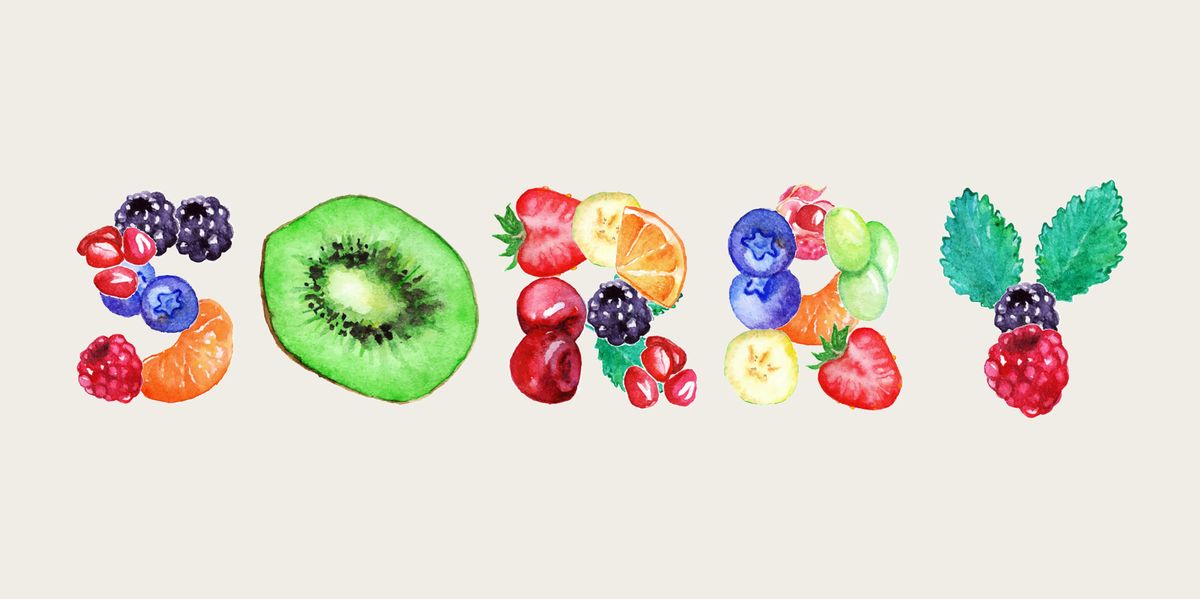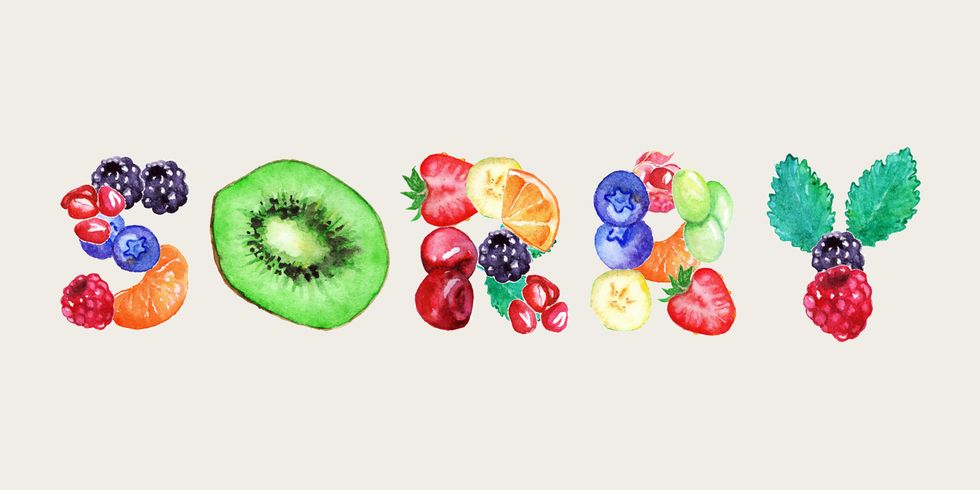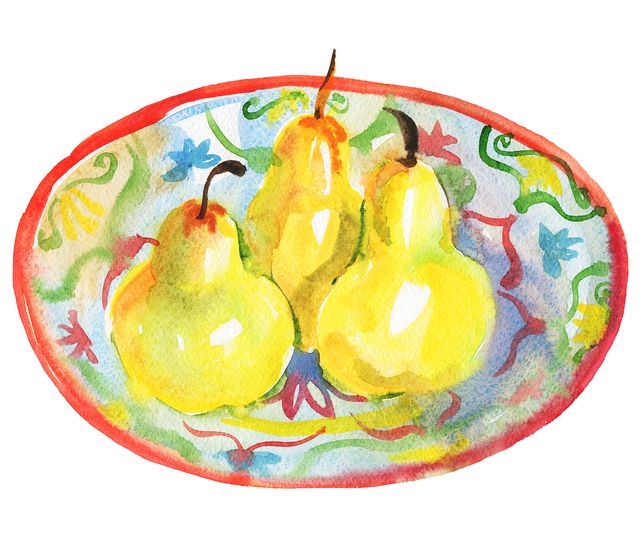Products You May Like
What if apologies became obsolete? Alternatively, imagine they’re replaced with fruit.
For example, a driver hits your dog, and the next day an apple appears on your front porch. A first-grader is reprimanded for kicking sand into the eyes of another child on the playground—he presents his victim with a banana. Step on the back of someone’s shoe, and you hand them a kiwi. Find a nail clipping in your soup, the restaurant gives you a nectarine. You get the picture. It doesn’t matter if it was an accident or an emotional reaction, a mistake or malicious intent—there’s no “sorry,” just fruit.
Apologizing requires a minimum level of emotional maturity, which is why you often see the gag on TV where a stubborn character cannot physically get themselves to apologize. Instead, they dry-heave through it or sometimes avoid it altogether (take, for instance, the infamous Post-it note Jack Berger leaves Carrie Bradshaw when he breaks up with her in Sex and the City). It’s not an easy thing to say when you don’t mean it, and even though “sorry” is just a word at the end of the day, adults take it as seriously as children. Why else would grieving families demand apologies from police, consumers from brands, the USWNT from the United States Soccer Federation, and countries from other countries? Even if the first place you learn to apologize is in the schoolyard, the practice isn’t restricted to childhood. But it’s something that many Asian parents have a hard time doing—they prefer to proffer fruit instead.
I’ve been seeing the “fruit in lieu of apology” anecdote pop up on social media consistently, primarily via Asian and Asian American Gen Zers who vent about how their parents use fruit as a way to avoid saying sorry. The tone is almost always humorous as they poke fun at both the mental gymnastics Asian parents must go through to equate fruit with apologizing and the disparity between getting berated and receiving a plate of fruit afterward. But there also seems to be an educational tone—a sense that you’re learning about foreign cultures—in clips where parents in certain households will replace “I love you” with a plate of fruit, and it signifies the same thing.
As a Korean-Taiwanese American, I’m familiar with the fruitpology idea. But the way this phenomenon is currently being presented in the media is disconcertingly matter-of-fact. The “in our culture, fruit equals love” message feels reductive and overstated.
I’m not saying the post-argument plate of fruit is an empty gesture, but it’s a huge leap to accept it as an apology (and especially as a substitute for love). Even if it comes from a place of affection, I’m uncomfortable with the idea that fruitpologies are simply part of Asian culture, because that would equate Asian culture with settling for a minimum of communication. It would mean Asian culture translates to repressed emotions and silent grudges. While these are problems in many Asian families, they don’t define us. Claiming fruitpology feels like a possibly well-intentioned but extremely ill-advised method of reappropriating the things Asians are often criticized for, like lack of expressiveness and robot-like qualities.
In the Harvard affirmative action case, evidence included reports that Asians scored low on the university’s nebulous personality scale. While Asian students’ standardized test scores and GPAs were often highly rated, time and again, their “personality” (or lack thereof) was the nail in the coffin. Tropes like fruitpology permeate the cultural consciousness and exemplify the type of behavior (poor communication skills, low EQ) that made Harvard’s admissions staff feel justified in giving Asians low personality scores. Hua Hsu’s memoir Stay True includes a scene where his Japanese-American friend Ken asks a Real World MTV casting agent why there are never any Asians on the show. She tells him plainly that Asians don’t have the personality for it. Identifying fruitpology as a part of Asian culture is akin to stating that “bad personality” is synonymous with it, which validates the prejudiced opinions of people like that MTV scout.
Even though some of the fruitpology videos are lighthearted, most of them are smiling-through-the-pain funny. Or possible-cry-for-help worrisome. They adopt the gallows humor of someone who feels powerless in a situation so the best they can do is make light of it. The role of fruit isn’t always as an apology substitute: In this video by TikTok user @spoiledmel, fruit is offered as an antidote to suicidal thoughts. Of course, it’s tongue-in-cheek and not a representation of this mother’s parenting technique, but the kernel of truth it gets at is the tendency for some Asian parents to react to mental health issues not with therapy, but with…fruit. It’s not hard to imagine why you’d need to develop a coping mechanism if your parents resort to fruit when you need actual support.
Curious about how others were reacting to the matter-of-fact presentation of the fruitpology dialogue, I turned to the comments. They ran the gamut: discouraged indifference, anger (at this type of communication), and defense of this practice (it’s a cultural difference!) The discouraged people felt that fruit was better than nothing. They appreciated that it was, at least, a gesture in the right direction. The angry folks said they would’ve greatly preferred a verbal apology, and some mentioned that they were estranged from their families because of the dismal communication exemplified by fruitpologies. The comment that resonated with me most was someone who said they never interpreted the fruit as an apology, “it was just [my parents] moving on…to eating fruit.” The hurtfulness of the sweeping everything under the rug component is real.
One particularly indignant reply defended parents who “stuck around to peel fruit after arguments.” The commenter believed that these plates of fruit represented a “capacity and mental strength to actually parent.” She also voiced appreciation that many of these fruit slicers grew up “amidst war, brutal colonization…[and] worked their asses off to provide [for] our entitled American asses.” In my mind, parents who had the resilience and fortitude to survive brutal colonization are capable of reflecting on their actions and apologizing when appropriate. It’s patronizing to imagine this is beyond them. Doubling down on fruitpologies strikes me as self-preserving more than anything. It’s a way to convince oneself that fruit was, in fact, an adequate substitute for emotionally available parents. While I can admire this woman’s zeal, I disagree that peeling fruit is a sign of capacity to parent. The commenter’s view gives too much credit to fruitpologies; the only reasonable takeaway from this practice is that Asian parents are good at chopping fruit.
The bulk of my discomfort resides with the sense of somewhat uneasy fondness that seems to pervade a lot of the fruitpology videos. The darkly humorous ones are more clearly critical of fruitpology, but when the trend is presented as endearing, it starts to feel insidious—like when you awkwardly laugh at a toddler’s bratty behavior because seeing someone so small with such an attitude is cute, but the toddler just perceives it as approval.
Treating the fruitpology with a chortling “that’s the best they can do” takes us back to the simplistic notion that it can be chalked up to a cultural difference. It reminds me of how when my grandfather died, multiple people at his funeral (some family members, some old Taiwanese people I had never met before) took it upon themselves to tell me that even if he never said or showed it, he loved me “in his own way.” I don’t believe I ever misunderstood him or the way he treated other people. I believe that the funeral attendees’ reassurances had less to do with making me feel better about the strained relationship I had with my grandfather, and more to do with a hope that when they died, someone would reassure their grandchildren that their unloving behavior was actually—plot twist—love all along. It’s a strength in numbers thing: the more people we can convince that not showing love is a way to show love, the more legitimized it is. That’s the paradox.
Many of my Asian American friends who grew up with parents that communicated via fruitpology are adamant that they will not repeat this cycle—another point that drives home the fact that fruit as a substitute for meaningful communication is absolutely not a mainstay of Asian culture. It’s is not a part of our heritage to be preserved and passed down from generation to generation. Deeming the fruitpology a cultural tradition is lazy and condescending, because it assumes Asian people are incapable of apologizing and loving openly and affectionately.
My concern with the toxic fondness surrounding fruitpologies is for those who normalize emotional negligence and don’t consider themselves deserving of apologies. Consider the free orange slices served at the end of the meal at many Asian restaurants: The complimentary fruit is a pleasant gesture, but neither the providing nor receiving party assigns them any value. Maybe that’s exactly how it should be.
Sanibel Chai is a New York City-based writer and admissions consultant. Her work has been published in New York magazine, Epiphany, and HotNewHipHop. She’s currently working on a novel that retells the Odyssey from Athena’s perspective.


